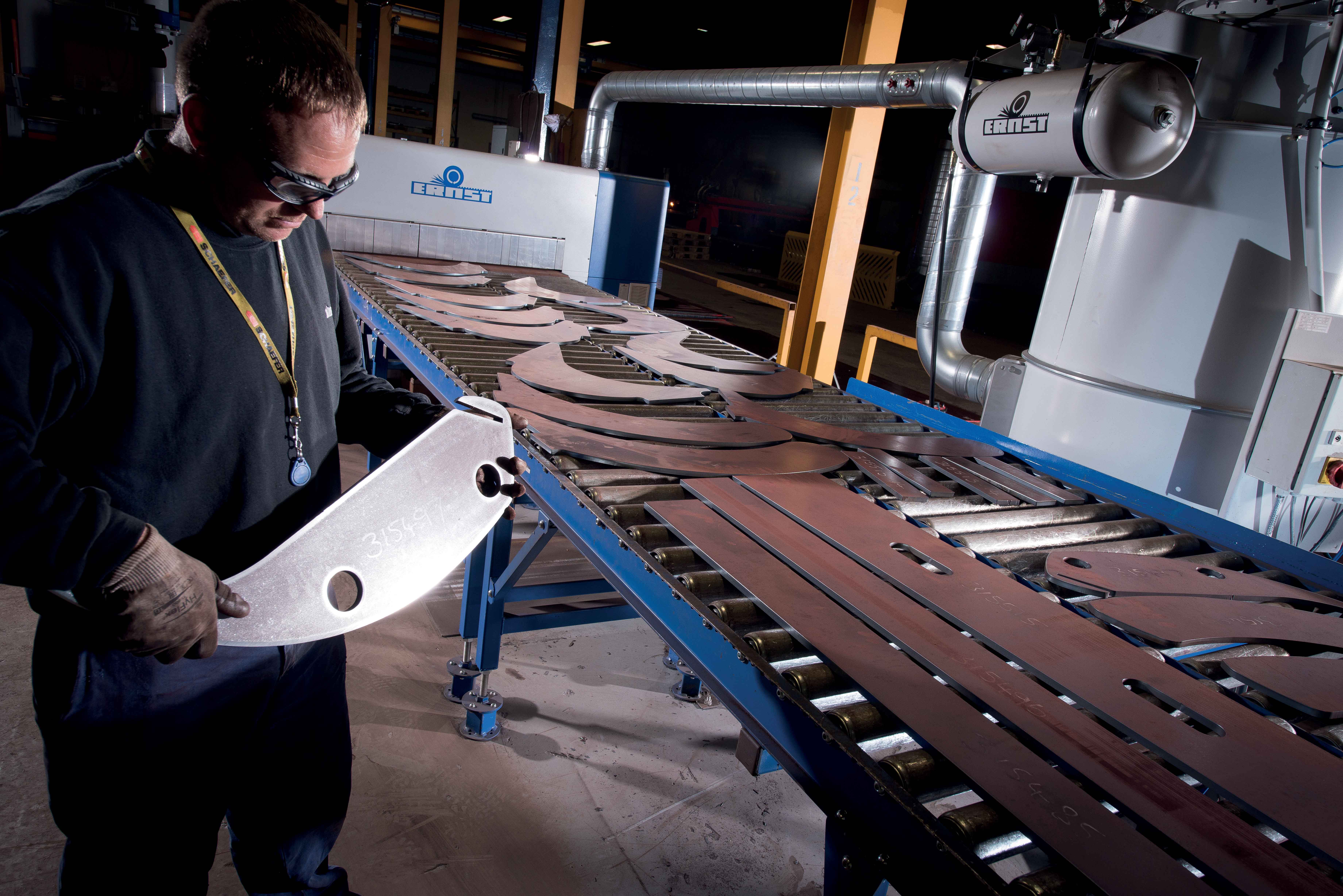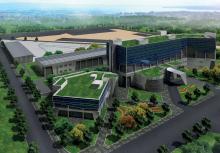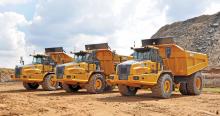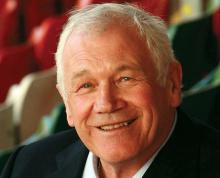
Innovative in its products and, more recently, in its production methods, Miller UK is a north-east England-based earthmoving attachments manufacturer set to reap the rewards of a shrewd and focused growth strategy. Guy Woodford spoke to the company’s managing director, Mike Askew.
Halfway through a five-year business development plan,
“Ex-colleagues ask what it’s like up here and wondered why I’m here. I’ve worked in PLCs, private companies, big and small firms, but this feels a bit like a racing car as you can make a decision about something and see it in effect very quickly. You can’t see that in large companies. It just takes longer. I’ve a very good management team who are receptive to the changes.”
Miller UK has built up an impressive reputation for its earthmoving attachments such as the PowerLatch, the PowerLatch Tilt coupler, mid to large sized excavator rock buckets, and, since their global launch at Hillhead 2014, its range of breakers. Its customer base includes many leading quarrying and construction OEMs, OEDs, end users and national equipment dealerships.
Company founders Keith, Gary and Jacqui Miller have taken a step back to become non-executive directors, after a gradual handover starting in 2013. Askew joined the company in November that year, with financial director Chris Parkin and Brendan Quill, sales and marketing director at Miller UK since February 2014, completing the three-strong senior management team.
Emphasising the change at Miller UK in his time with the company, Askew says: “When I arrived two-anda- half years’ ago and walked into the factory in Cramlington, I could see that the design of our buckets was special, but the production processes were not particularly special. When we looked at the numbers there were losses in the operation. Relatively quickly we had to decide whether we were going to offshore it [production], which is what everyone else does, or whether we were going to invest in order to improve the productivity of the plant. The reason we chose the latter was because we feel there’s a place for UK-designed and manufactured buckets for 13tonne and upwards machines.”
There’s as much pragmatism as there is ambition about Askew; a determination for a company he manages to deliver one or two key projects, rather than starting and never finishing ten or more. This approach is evident in how he and his fellow management team members have changed Miller’s production and distribution models.
“The UK is a high cost base environment. If we’re going to manufacture anything in this country, it has to be done on the back of it being a world-class facility. It inevitably meant using greater automation than we had been using. We convinced ourselves to invest in the plant here so that it was making a profit. We have a short supply chain, don’t hold much stock and have the ability to make buckets quickly.
“Another thing we’ve invested in is changing the make-buy. We used to subcontract some of the machining activities to the locality, such as the boring of couplers. All of the machine shops in this locality do oil and gas which pays at a much higher rate than construction, and there were two problems we found. One was that our demand is seasonal: in the winter we don’t need all the capacity, and if we were competing with an oil and gas customer we felt we were getting left behind. So we’ve invested in some machining activities simply to improve our service level. I’m able to have the capacity available when I want it, to make sure that our lead times remain short and our responsiveness remains good. It’s worked out well for us.”
Askew says further investment aimed at maintaining high service levels will include the introduction of ERP (Enterprise Resource Planning) business management software, offering Miller UK’s management team an integrated view of the company’s core business processes.
Evidence of Miller UK’s near £1.5 million (€1.89 million) investment in its Cramlington, county Northumberland HQ factory are evident when touring the upgraded site. There are three small welding robots for the company’s smaller buckets and one large robot welder for the 35tonne buckets. Aiding high-quality bucket fabrication are new highly accurate plasma cutters, a high-speed dressing machine, and a press break.
“The new robot welders are really about the rate that we can weld and the deposition rate. They are really quite exciting,” enthuses Askew. “The plasma cutters deliver multiple benefits. Not only are they faster but we get better utilisation of the steel. Our scrap has gone down significantly.
“As well as improving productivity, the other thing that moving to automation stops is us being a seasonal business. Before, we would be hiring at this time of year (May), firing at the back end of the year. It’s not good for productivity, quality or health and safety. There’s probably another step for us to go in terms of having an almost fully automated factory. Realistically, that’s in the next five-year plan.”
Askew is also keen to stress how there’s been a significant investment in Miller UK’s product range and R&D since he and his management team joined the firm. “We’ve got the organisation used to getting results from its design and development activity.
We’re much more focused on what we’re producing. The PowerLatch Tilt coupler we launched last year is doing well. The next generation PowerLatch model will be launched early next year, probably in the UK to start with.” Askew said the next generation of Miller UK’s PowerLatch Tilt coupler would be unveiled mid-to-late 2017.
Miller UK’s rock buckets for 35tonne class and above excavators involved in quarrying applications are currently selling well. Of the company’s breaker sales, Askew says: “It’s a crowded marketplace but we’re getting some traction. It’s probably not quite as fast as we thought it would be, but we’re only two years into it. Obviously, Hewden [£1 million Miller UK 1.5-22tonne excavator breakers’ order] was a particularly good breakthrough last year. There’s some great innovations on the product.”
While gaining some market share for its earthmoving attachments in mainland Europe, Miller UK has traditionally seen strong sales in the UK, North America and India – the latter country now starting, says Askew, to produce some sales growth, while also being a key location for Miller’s R&D capabilities.
“Historically we had a warehouse in Mumbai for our stock and distributed from there to our distributors. We recently moved that to Bangalore, to a new facility that has offices as well as a warehouse, and we employ there four experienced Indian graduate engineers. For the second half of 2015, all four of them were based here, working alongside our engineers being trained up in our systems and processes. There’s two reasons for hiring them. Not only are they very talented engineers and very well educated, we also have an additional five working hours per day which improves engineering output in a reasonably cost-effective manner.
This has given us some additional capacities to work on new projects.” Askew is keen for Miller UK to identify new growth markets and has been encouraged by more recent sales of its product range in Australia. “We’ve put a lot of energy over the last two years into tapping into sales opportunities there. We’re finding in Victoria and New South Wales, in Melbourne and Sydney, there’s a strong general construction market. Last year the market represented 5% of our total sales.
“We have the benefit of a truly global brand name. One of the things that often surprises me is that wherever you go people know who Miller is.”
Miller UK was due to showcase its full product range at the prestigious
“We’ve got to grow. Ultimately, our cost base is much better than it was. We’ll always have more things to do; that’s the whole point of continuous improvement. “We’ve got to get scale and we’ll get that by being selective and focused in terms of the territories we go after, the products we develop, and the service levels we operate and offer.”









